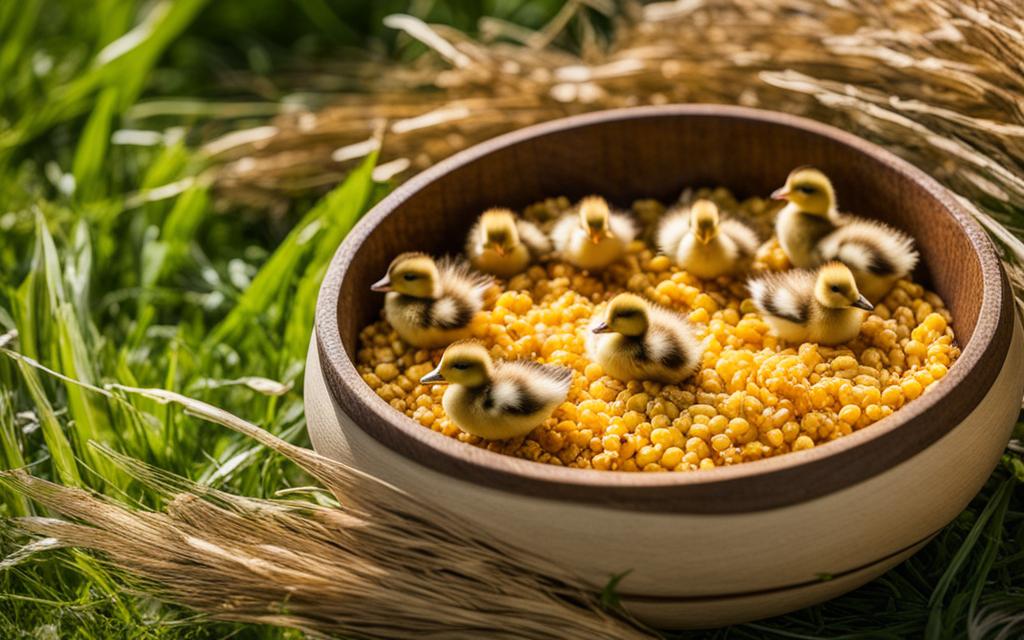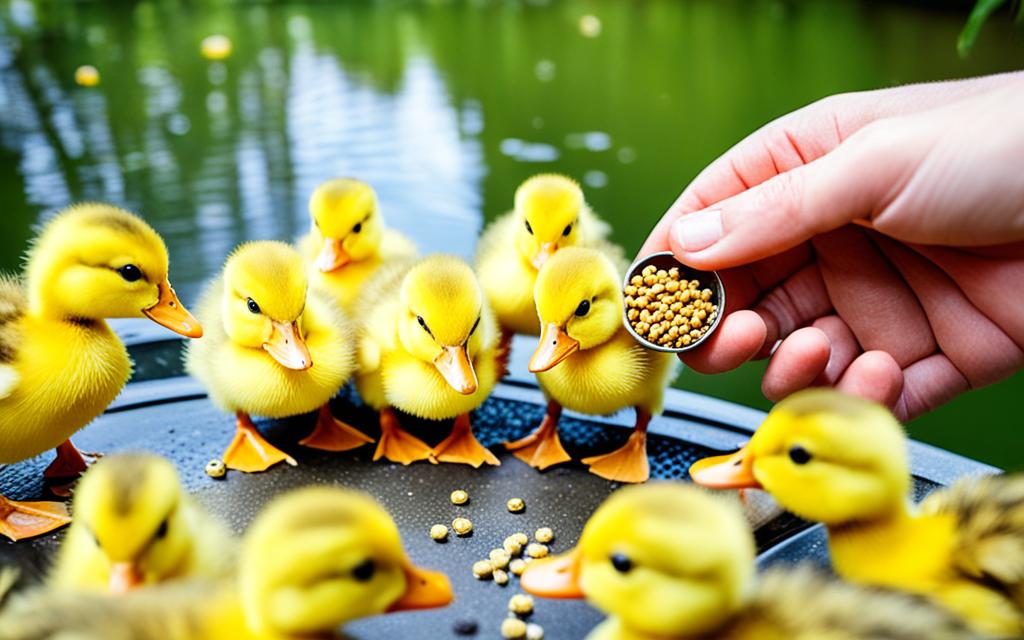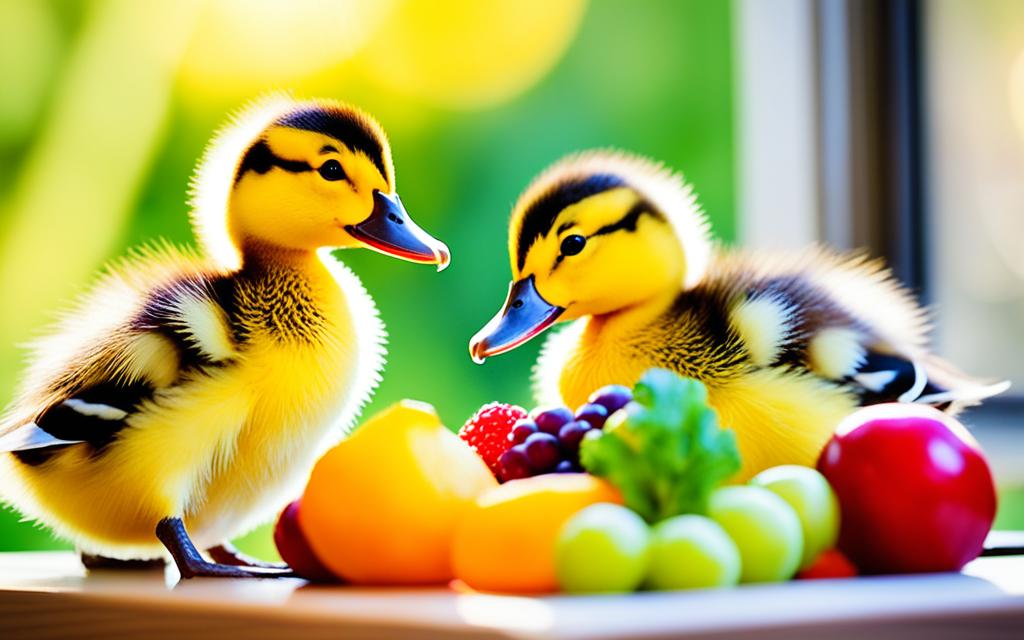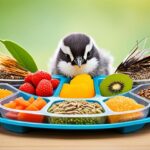Welcome to our comprehensive guide on feeding baby ducks. Whether you’re a new duckling owner or looking to expand your knowledge, understanding a duckling’s diet is essential for their health and growth. In this article, we will explore what baby ducks eat and provide helpful tips to ensure they receive a balanced and nutritious diet.
Feeding baby ducks requires careful consideration of their nutritional needs at different stages of their development. From the first week of life to transitioning to solid foods, we will cover it all. We will also discuss the importance of clean water in a duckling’s diet and explore various food options to incorporate in their meals.
For those who prefer homemade options, we will share some simple and nutritious duckling feed recipes. Additionally, we will discuss the use of supplements and treats, as well as provide practical tips on how to feed ducklings effectively.
Key Takeaways:
- Understanding a baby duck’s diet is crucial for their overall health and growth.
- During the first week of life, ducklings should be fed specially formulated starter feeds.
- Water plays a vital role in a baby duck’s diet and digestion.
- There are various food options such as commercial feeds, insects, greens, and grains that baby ducks can eat.
- Supplements and treats can be used to enhance a duckling’s diet, but precautions should be taken.
Duckling Feeding Guide
Feeding baby ducks can be an exciting and rewarding experience. Providing them with a nourishing and balanced diet is essential for their growth and development. In this comprehensive duckling feeding guide, we will explore the types of food suitable for baby ducks and their nutritional requirements, ensuring that your little feathered friends thrive.
The Nutritional Needs of Ducklings
Ducklings require a diet rich in protein and other essential nutrients to support their rapid growth. A balanced diet should consist of a combination of formulated feeds, natural foods, and treats. Let’s take a closer look at their nutritional needs:
- Protein: Protein is crucial for muscle development and overall health. Ensure that the feeds you provide contain a high percentage of protein, typically around 18-20% for ducklings.
- Micronutrients: Ducklings also need essential vitamins and minerals for proper growth. Look for feeds specifically formulated for ducklings, as they will have the appropriate balance of these micronutrients.
- Water: Water is essential for digestion and overall hydration. Ducklings should have access to clean, fresh water at all times. Ensure that their water source is accessible and shallow enough to prevent drowning accidents.
- Grit: As ducklings start to explore the outdoors and forage for food, they will need grit to aid in digestion. Grit helps break down the food in their gizzards and makes it easier to absorb nutrients.
To provide the best diet for your ducklings, a combination of commercial feeds, natural foods, and treats is recommended. Let’s explore some suitable options:
Types of Food for Baby Ducks
Baby ducks can enjoy a variety of foods that cater to their nutritional needs. Here are some of the best options:
- Commercial Duckling Feed: Commercial feeds specifically designed for ducklings provide a balanced combination of nutrients. Look for feeds with a high protein content to support their growth.
- Insects and Bugs: Ducklings love to forage for insects and bugs in their surroundings. Offer them mealworms, crickets, and earthworms as a nutritious and enriching treat.
- Leafy Greens: Ducklings can enjoy a variety of leafy greens such as lettuce, spinach, and kale. Make sure to chop them into small, manageable pieces.
- Grains: Whole grains like corn, oats, and barley can be provided to ducklings in moderation. These grains provide energy and essential nutrients.
- Fruits and Vegetables: Offer ducklings small portions of fruits and vegetables like watermelon, berries, peas, and carrots. These healthy snacks add variety to their diet and provide additional vitamins and minerals.
Remember to introduce new foods gradually and observe your ducklings’ reactions. It’s essential to monitor their intake and ensure that their diet is well-balanced and appropriate for their age and size.
As you navigate the world of duckling feeding, remember to prioritize their well-being and nutrition. Offering a diverse and nutritious diet will not only keep them healthy but also provide enrichment and promote natural foraging behaviors. With this comprehensive feeding guide, you can give your baby ducks the best start in life.
First Week of Life
During the first week of a duckling’s life, their diet is of utmost importance for their health and development. Providing them with the right baby duck food is essential for their optimal growth.
At this stage, it is recommended to feed ducklings specially formulated starter feeds. These feeds are designed to meet the nutritional needs of young ducklings and support their early development. Starter feeds are easily digestible and contain the necessary nutrients for their rapid growth.
Duckling starter feeds typically consist of a blend of high-quality grains, proteins, vitamins, and minerals. These feeds are specially formulated to provide the right balance of nutrients that ducklings require during their first week of life.
During the first week, it is important to establish a feeding schedule to ensure the ducklings receive consistent and adequate nutrition. Aim to provide them with small, frequent meals throughout the day. These small meals help avoid overfeeding and improve digestion.
Make sure to monitor the ducklings’ feeding behavior and adjust the portion sizes accordingly. Overfeeding can lead to health issues, while underfeeding can hinder their growth and development. Strike a balance by observing their appetite and adjusting their food portions accordingly.
Recommended Types of Baby Duck Food for the First Week
Here are some recommended types of baby duck food that you can feed during the first week:
- Duckling Starter Crumbles: These are small-sized, easy-to-eat pellets that provide the necessary nutrients for the ducklings’ growth.
- Mashed Hard-Boiled Eggs: High in protein, mashed hard-boiled eggs can be offered as a supplemental treat. Remember to remove the shell before feeding.
- Finely Chopped Leafy Greens: Introduce small amounts of finely chopped leafy greens, such as lettuce or spinach. These greens provide additional vitamins and minerals.
- Fresh Drinking Water: Along with their food, it is crucial to provide clean, fresh drinking water at all times. Use a shallow dish or container that the ducklings can easily access without the risk of drowning.
During the first week of life, it’s best to focus on providing the recommended baby duck food and ensuring they have access to fresh water at all times. As they grow, their diet and feeding requirements will gradually change, which we will discuss in later sections.
Transition to Solid Foods
As baby ducks grow, it’s essential to gradually introduce them to solid foods to support their development and meet their nutritional needs. The transition to solid foods typically occurs when they are around 2-3 weeks old.
At this stage, their digestive system becomes more capable of processing solid foods, enabling them to explore a wider range of options beyond their initial starter feeds. Introducing solid foods gradually allows their bodies to adjust and ensures a smooth transition.
When introducing solid foods to baby ducks, it’s important to provide a balanced diet that incorporates a variety of nutrient-rich options. Here are some recommended foods for their diet:
- Insects: As baby ducks start exploring their environment, they naturally come into contact with insects. Insects offer a valuable source of protein and can be an enjoyable addition to their diet.
- Vegetables and Greens: Including a variety of vegetables and greens in their diet provides essential vitamins and minerals. Leafy greens, such as kale or lettuce, and vegetables like peas or carrots can be finely chopped or shredded to make them easier for ducklings to consume.
- Millet and Grains: Millet and grains like corn or oats can be added to their diet as a source of carbohydrates. These can be offered in small quantities and gradually increased as they grow older.
- Pellets or Crumbles: Transitioning to age-appropriate pellets or crumbles designed for ducklings ensures they receive a balanced mix of nutrients. It’s important to choose feeds specifically formulated for ducklings to meet their nutritional requirements.
Remember to provide fresh, clean water alongside their solid food, as water is essential for digestion and overall health. Gradually reducing the frequency of starter feeds as you introduce solid foods will help them transition smoothly. Monitor their eating habits and adjust their diet accordingly to ensure they are receiving the necessary nutrients.
It’s crucial to provide a balanced and diverse diet as baby ducks transition to solid foods. This promotes healthy growth, strengthens their immune system, and sets the foundation for their future diet.
Here is an example of a table that illustrates the recommended transition process and suitable solid foods for baby ducks:
| Week | Transition Process | Solid Foods |
|---|---|---|
| Week 1-2 | Continue feeding starter feeds | Starter feeds, small pieces of leafy greens |
| Week 2-3 | Start introducing solid foods while reducing the frequency of starter feeds | Pellets or crumbles, finely chopped vegetables and insects |
| Week 4 and onwards | Transitioned to a fully solid food diet | Pellets or crumbles, a variety of vegetables, insects, and grains |
By gradually introducing solid foods and offering a diverse diet, you can ensure that your baby ducks receive the necessary nutrients for their growth and overall well-being.
Importance of Water
Water is an essential component of a baby duck’s diet. Providing clean and fresh water is crucial for their overall health and well-being. Ducklings require access to water throughout the day to stay hydrated and aid in digestion.
Water plays a key role in duckling nutrition, as it helps with the proper breakdown and absorption of food. It softens their food, making it easier to swallow and digest. Additionally, water helps regulate body temperature, keeping ducklings cool during hot weather.
When feeding baby ducks, it’s important to ensure that their water source is clean and free from contaminants. Dirty water can lead to health problems and hinder their growth. Ensure that you clean the water container regularly and replace it with fresh water daily.
Ducklings instinctively know how to drink water, but they may need assistance initially. Gently dipping their beaks into the water will help them understand and start drinking on their own. Be cautious not to submerge their nostrils, as this could lead to aspiration.
Remember, ducklings should not be given deep water to swim in until they develop their feathers fully, as they could become chilled or drown. Provide a shallow container for them to splash and play in, ensuring their safety at all times.
Here are some key points to remember about water and ducklings:
- Water is essential for duckling nutrition and digestion.
- Clean and fresh water should be provided daily.
- Water helps regulate body temperature.
- Assist ducklings in drinking water initially, if needed.
- Do not allow ducklings to swim in deep water until their feathers are fully developed.
By ensuring that your baby ducks have access to clean water and monitoring their water intake, you can contribute to their healthy growth and development.
Quote:
“Water is the elixir of life for baby ducks. It nourishes their bodies, aids in digestion, and keeps them cool. So, never underestimate the importance of clean and fresh water for your feathered friends.” – Duck Enthusiast
Duckling Water Consumption Guide:
| Age | Water Consumption (per duckling) |
|---|---|
| First week | Approximately 2 fluid ounces per day |
| Second week | Approximately 4 fluid ounces per day |
| Third week | Approximately 6 fluid ounces per day |
| Fourth week | Approximately 8 fluid ounces per day |
Remember that these are approximate values, and the water consumption may vary depending on factors such as temperature, activity level, and individual duckling needs.
Types of Foods for Ducklings
When it comes to feeding baby ducks, there are several options to ensure they receive a well-balanced diet. Incorporating a variety of foods will not only provide essential nutrients but also stimulate their natural foraging instincts. Below, we explore different types of foods that baby ducks can eat:
1. Commercial Feeds
Commercial feeds specifically designed for ducklings are an excellent option to meet their nutritional needs. These feeds are formulated with the right balance of proteins, vitamins, and minerals essential for their growth and development. Look for high-quality commercial feed options available in your local pet stores or farm supply outlets.
2. Insects
Ducklings enjoy munching on insects, which provide a good source of protein. They relish mealworms, crickets, and earthworms. However, ensure the insects are safe and free from any pesticides or harmful chemicals that could harm your ducklings.
3. Greens
Incorporating fresh greens into their diet not only adds variety but also provides essential vitamins and minerals. Ducklings love nibbling on lettuce, spinach, kale, and other leafy greens. Remember to wash the greens thoroughly to remove any dirt or residue before offering them to your ducklings.
4. Grains
Grains are a great source of energy for baby ducks. You can feed them cracked corn, wheat, barley, or oats. These grains can be soaked in water for a few hours or cooked before feeding to make them easier to digest for young ducklings.
“Incorporating a variety of foods will not only provide essential nutrients but also stimulate their natural foraging instincts.”
When offering different foods to your ducklings, it is important to introduce new items gradually to avoid any digestive upset. Additionally, always provide fresh water for drinking and ensure it is easily accessible for the ducklings. Remember, a healthy and varied diet is key to raising happy and thriving baby ducks.
Recommended Foods for Baby Ducks
| Food Type | Recommended Options |
|---|---|
| Commercial Feeds | High-quality duckling feeds available at pet stores or farm supply outlets |
| Insects | Mealworms, crickets, earthworms |
| Greens | Lettuce, spinach, kale, other leafy greens |
| Grains | Cracked corn, wheat, barley, oats |
Homemade Duckling Feed Recipes
For those who prefer homemade options, we have some simple and nutritious duckling feed recipes that can be easily prepared at home. These recipes are a great way to provide your baby ducks with wholesome meals while ensuring they get all the necessary nutrients for their growth and development.
Recipe 1: Duckling Starter Mash
Ingredients:
- 1 cup of organic duckling starter feed
- 1/2 cup of ground oats
- 1/4 cup of finely chopped spinach or kale
- 1/4 cup of grated carrots
- 1/4 cup of boiled and mashed peas
- 1/4 teaspoon of brewer’s yeast (optional)
Instructions:
- In a mixing bowl, combine the duckling starter feed and ground oats.
- Add the finely chopped spinach or kale, grated carrots, and mashed peas.
- If desired, sprinkle the brewer’s yeast for an added nutritional boost.
- Mix all the ingredients until well combined, forming a mash-like consistency.
- Serve the duckling starter mash to your baby ducks, making sure it is fresh and easily accessible.
Recipe 2: Homemade Duckling Treats
Ingredients:
- 1 cup of whole wheat flour
- 1/2 cup of peanut butter (unsalted and unsweetened)
- 1/4 cup of grated apples
- 1/4 cup of finely chopped herbs (such as parsley or cilantro)
- 1/4 teaspoon of ground flaxseed (optional)
Instructions:
- In a mixing bowl, combine the whole wheat flour and peanut butter.
- Add the grated apples and finely chopped herbs.
- If desired, sprinkle the ground flaxseed for added health benefits.
- Knead the mixture to form a dough, adding water if needed to achieve the right consistency.
- Roll out the dough on a floured surface and use cookie cutters to create fun shapes.
- Bake the treats in a preheated oven at 350°F for 15-20 minutes or until golden brown.
- Allow the treats to cool completely before serving them as occasional snacks to your baby ducks.
Remember to always provide fresh water alongside these homemade feed recipes. Monitoring your ducklings’ eating habits and adjusting their diet as they grow is essential for their well-being. These homemade duckling feed recipes can be a delightful addition to their diet, supplementing the commercial feeds they consume.

Supplements and Treats
In addition to their main diet, ducklings can benefit from the inclusion of supplements and treats. These provide additional nutrients and variety to their meals, supporting their overall well-being and development. However, it’s essential to offer these supplementary foods in moderation and with proper precautions.
Benefits of Supplements
Supplements can help enhance the nutrition provided by the duckling’s primary diet. They can address specific nutrient deficiencies, promote healthy growth, and boost the ducklings’ immune system. Some common supplements for baby ducks include:
- Vitamin supplements: These help ensure the ducklings are getting sufficient vitamins, especially vitamins A, D, and E, which are essential for their growth and overall health.
- Probiotics: Probiotic supplements support the development of a healthy gut flora in ducklings, aiding digestion and nutrient absorption.
It’s important to consult with a veterinarian or avian nutritionist to determine the appropriate dosage and duration for administering supplements to your ducklings.
Caution with Treats
Treats can be a fun addition to a duckling’s diet, but they should be offered sparingly and in moderation. Too many treats can disrupt the nutritional balance of their primary diet and lead to health issues. When introducing treats to baby ducks, keep the following in mind:
- Fruits and vegetables: Cut up small pieces of fresh fruits and vegetables like watermelon, lettuce, or peas can be given as treats. Ensure that they are finely chopped and appropriate for the ducklings’ size to avoid choking hazards.
- Mealworms and insects: Mealworms and insects can be an excellent source of protein for ducklings. However, ensure that the insects are safe and free from pesticides or other harmful substances.
Always monitor the ducklings’ reaction and digestion when introducing new treats. If you notice any adverse effects, discontinue the treat and consult a veterinarian.
Feeding Tips for Ducklings
Feeding ducklings is an important aspect of their care, and knowing how to do it effectively will contribute to their overall health and well-being. Here are some practical tips to guide you in feeding these adorable little creatures:
1. Choose the Right Food
When it comes to feeding ducklings, it’s essential to provide them with the appropriate food that meets their nutritional needs. A specialized starter feed designed for ducklings is the best choice during their early stages of life. These feeds are formulated to provide the right balance of proteins, vitamins, and minerals for their growth and development.
2. Feed Ducklings Frequently
Ducklings have high energy requirements, and their stomachs are relatively small. To ensure they receive enough nutrients, it’s recommended to feed them small portions several times a day. Divide their daily food into three to four feedings, spacing them out evenly throughout the day.
3. Monitor Eating Habits
Observing the eating habits of your ducklings is crucial. Ensure that they are actively eating and showing healthy eating behaviors. If a duckling is consistently refusing food or not eating as much as usual, it may be a sign of an underlying health issue, and a veterinarian should be consulted.
4. Provide Clean Water
In addition to their food, ducklings also need access to clean and fresh water at all times. Offer water in shallow dishes or containers that are easily accessible for them. Ducklings will not only drink the water but also use it to clean their bills and feathers.
5. Avoid Overfeeding
While it’s important to ensure ducklings receive enough food, it’s equally crucial to avoid overfeeding them. Overfeeding can lead to obesity, which can have negative impacts on their health and growth. Monitor their body condition and adjust the portion sizes accordingly to maintain a healthy weight.
6. Introduce Solid Foods Gradually
As ducklings grow, it’s important to introduce solid foods gradually alongside their starter feed. Begin by offering small amounts of finely chopped greens, vegetables, or insects. Monitor their response to these new foods and gradually increase the portion sizes as they become accustomed to eating solids.
| Types of Solid Foods for Ducklings | Recommended Time for Introduction |
|---|---|
| Finely chopped leafy greens (e.g., spinach, kale) | 1-2 weeks old |
| Diced vegetables (e.g., carrots, peas) | 2-3 weeks old |
| Small insects (e.g., mealworms) | 3-4 weeks old |
7. Provide Enrichment
Ducklings are curious creatures and need mental stimulation. Offer them food in different ways, such as scattering it across the floor or using puzzle feeders. This not only makes feeding more interesting for them but also encourages natural foraging behaviors.
Remember, a well-fed and happy duckling is a healthy duckling!
By following these feeding tips and ensuring a balanced diet, you can contribute to the healthy growth and development of your ducklings.
Potential Feeding Issues
While feeding baby ducks can be a rewarding experience, occasionally, you may encounter certain feeding issues or come across ducks with specific dietary requirements. It’s essential to address these concerns promptly to ensure the ducks’ overall health and well-being. Here, we will discuss some common feeding problems and provide suitable solutions to meet the nutritional needs of baby ducks.
Poor Appetite
There may be instances when a baby duck has a decreased appetite or shows disinterest in food. This could be due to various factors, such as illness, stress, or an unsuitable diet. It’s important to identify the underlying cause and take appropriate action.
Solution: If you notice a duckling with a poor appetite, consider offering smaller and more frequent meals. Opt for easily digestible foods like softened pellets or wet mash. Additionally, providing a calm and stress-free environment can encourage better eating habits.
Feeding Competition
In scenarios where multiple ducks are fed together, it’s common for competition to arise during mealtime. This can lead to certain ducks not getting their fair share of food.
Solution: To tackle feeding competition, consider using multiple feeding stations or distributing the food in small piles. This helps ensure every duckling has equal access to sufficient food, reducing the risk of malnutrition.
Allergic Reactions
Some ducks may exhibit allergic reactions to certain foods, resulting in symptoms like skin rashes or digestive issues. Identifying these allergies is crucial to prevent any adverse effects on the duck’s health.
Solution: To address allergic reactions, consult with a veterinarian or avian specialist. They can conduct allergy tests and provide guidance on eliminating allergens from the duck’s diet while ensuring their nutritional needs are still met.
Lack of Nutrients
Inadequate nutrient intake can lead to deficiencies and impact a duckling’s growth and development.
Solution: If you suspect a lack of specific nutrients, consider offering a balanced and commercially formulated duck feed. These feeds are designed to provide essential minerals and vitamins required for healthy growth. Alternatively, you can consult with a veterinarian to get recommendations on appropriate dietary supplements.
Inappropriate Foods
Feeding baby ducks inappropriate foods can lead to digestive issues, nutritional imbalances, or even toxicity.
Solution: Ensure you are offering suitable foods based on the duckling’s age and nutritional requirements. Avoid feeding them bread, as it lacks essential nutrients and can cause developmental issues. Stick to a diet consisting of appropriate commercial feeds, grains, greens, and insects.

| Feeding Issue | Solution |
|---|---|
| Poor Appetite | Offer smaller and more frequent meals. Provide easily digestible foods like softened pellets or wet mash. Ensure a calm and stress-free environment. |
| Feeding Competition | Use multiple feeding stations or distribute food in small piles to ensure equal access for all ducklings. |
| Allergic Reactions | Consult with a veterinarian or avian specialist to identify allergens in the duck’s diet. Eliminate the allergens while meeting their nutritional needs. |
| Lack of Nutrients | Provide balanced and commercially formulated duck feeds or consider dietary supplements recommended by a veterinarian. |
| Inappropriate Foods | Avoid feeding bread and offer a diet consisting of appropriate commercial feeds, grains, greens, and insects. |
Gradual Diet Changes
As ducklings mature, their dietary needs evolve to support their growth and development. Gradually introducing new foods and making diet adjustments is essential to ensure their nutritional requirements are met. Here, we will outline the process of transitioning a duckling’s diet and provide helpful tips to ensure a smooth transition.
1. Introduce New Foods Slowly
When introducing new foods, such as vegetables or pellets, to a duckling’s diet, it is crucial to do so gradually. Start by offering small portions and observe their response. Monitor any changes to their digestion or overall health. This gradual approach helps their digestive system adapt and minimizes the risk of gastrointestinal issues.
2. Mix Old and New Foods
During the transition, mix the old and new foods together. This helps familiarize the duckling with the new taste and texture while providing some familiarity. Slowly increase the proportion of the new food over time while reducing the amount of the old food. This method allows the duckling to adjust to the new diet without causing any sudden disruptions.
3. Monitor Duckling’s Response
Observe your duckling’s response to the new foods. Look for signs of acceptance, such as enthusiastic eating, and monitor their overall health. If you notice any adverse reactions or digestive issues, consult a veterinarian for guidance.
4. Adjust Feedings and Portions
As the duckling’s dietary requirements change, adjust the frequency and portion sizes of their feedings accordingly. Consult a veterinarian or refer to the feeding guidelines provided by the specific brand of food being used. Maintaining a balanced and appropriate diet is crucial for their continued growth and well-being.
5. Provide a Balanced Diet
Ensure that the new diet provides a balance of essential nutrients. Ducklings require a mix of proteins, carbohydrates, fats, vitamins, and minerals for healthy growth. Seek guidance from a veterinarian or specialized resources to ensure the new diet meets these nutritional needs.
By implementing these gradual diet changes, you can support your duckling’s growth and development while ensuring they receive a varied and nutritious diet.
| New Foods | Benefits |
|---|---|
| Leafy greens (spinach, kale) | Provide essential vitamins and minerals |
| Insects (mealworms, crickets) | Rich source of protein and encourage natural foraging behavior |
| Unsalted seeds (sunflower, pumpkin) | Supply healthy fats and necessary nutrients |
| Commercial duckling pellets | Ensure a balanced diet with essential nutrients |
Conclusion
In this comprehensive duckling feeding guide, we have covered the essential elements of a baby duck’s diet and how to meet their nutritional needs throughout their development. By understanding what baby ducks eat and providing them with a balanced diet, you can ensure their overall health and growth.
During the first week of life, it is crucial to feed ducklings specially formulated starter feeds to give them the necessary nutrients. As they grow, gradually introduce solid foods into their diet and offer a variety of foods such as commercial feeds, insects, greens, and grains.
Water is also essential for the well-being of baby ducks. Make sure to provide clean water to help with their digestion and overall hydration. Additionally, consider incorporating homemade duckling feed recipes and supplements as treats to enhance their diet.
To feed ducklings effectively, follow our feeding tips, which include proper feeding techniques, portion sizes, and monitoring their eating habits. If you encounter any feeding issues or have specific dietary requirements, consult a veterinarian for guidance.
By following this duckling feeding guide and providing a proper diet, you are setting the foundation for your feathered friends’ long and healthy life.
FAQ
What do baby ducks eat?
Baby ducks eat a diet primarily consisting of specially formulated starter feeds during their first weeks of life. As they grow, they can gradually transition to solid foods such as insects, greens, grains, and commercial duckling feeds.
What is the duckling feeding guide?
The duckling feeding guide provides information on how to feed ducklings properly. It includes recommendations on the types of food suitable for baby ducks and their nutritional requirements at each stage of their development.
What should baby ducks eat during their first week of life?
During the first week of a duckling’s life, it is recommended to feed them specially formulated starter feeds. These feeds are designed to provide the necessary nutrients for their growth and development.
When should baby ducks transition to solid foods?
Baby ducks can gradually transition to solid foods around 2-3 weeks of age. Introducing solid foods too early can be challenging for their digestion, so it is important to wait until they are developmentally ready.
Why is water important for baby ducks?
Water is essential for baby ducks as it aids in digestion, lubricates their food, and helps them maintain hydration. Clean and freshwater should always be available for ducklings to drink.
What are the types of foods suitable for ducklings?
Baby ducks can eat a variety of foods, including commercial duckling feeds, insects, greens (such as lettuce or spinach), and grains (such as cracked corn or wheat). These foods provide the necessary nutrients for their growth and development.
Are there any homemade duckling feed recipes?
Yes, there are simple and nutritious homemade duckling feed recipes available. These recipes often include a combination of grains, seeds, and vegetables. However, it is important to ensure the recipes provide a balanced diet and meet the ducklings’ nutritional needs.
Can ducklings have supplements and treats?
Ducklings can have supplements and treats in moderation. These should be offered as occasional additions to their main diet and should not replace their essential nutritional needs. Always be cautious and choose treats that are safe and appropriate for ducklings.
What are some feeding tips for ducklings?
When feeding ducklings, it is important to consider their feeding techniques, portion sizes, and monitor their eating habits. Providing small and frequent meals, ensuring access to fresh water, and observing their appetite can help ensure they receive adequate nutrition.
What are some common potential feeding issues for ducklings?
Common feeding issues for ducklings may include overeating, selective eating, or nutrient deficiencies. These issues can be addressed by monitoring their feeding habits, providing a balanced diet, and consulting a veterinarian if necessary.
How should diet changes be introduced to ducklings?
Diet changes for ducklings should be introduced gradually over time to prevent digestive issues. Slowly incorporate new foods into their diet while decreasing the amounts of the previous feeds. This helps them adjust to the changes and ensures their nutritional needs are met.








